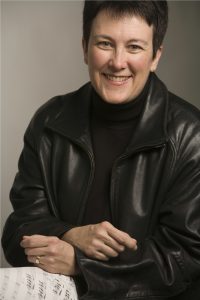Riding to the opera through the New Mexican landscape of twilight mountains and ever shifting clouds, I wondered why Jennifer Higdon, a Pulitzer Prize-winning female composer, had chosen the novel Cold Mountain as a basis for her first opera.

The program notes emphasized the fact that the novel was about a man, W. P. Inman, a wounded deserter from the Confederate army, who was trying to get home to his beloved, Ada Munroe. Inman’s journey, according to the notes, was much like that of Odysseus returning from the wars and encountering many battles along the way. What the heck? I thought, as I read that. This was my first opera by a woman. Why had she chosen a man’s story, and especially a story based on Homer in which manhood is defined by wiliness and violent action?
During the first act, as the sun turned the sky orange and lavender, I realized that the classic notion of a male hero had been redefined. The hero of the opera “Cold Mountain” leaves before the war is over and his long journey home, although involving Odessian encounters with a blind seer, with sirens, and aggressive enemies, is characterized nonetheless by compassion and understanding. This Odysseus protects isolated females, saves a baby from being thrown into a gorge, and shows empathy toward the slave woman who picks the pockets of dead soldiers and wishes she could kill all white people with a single bullet. (The hero of “Cold Mountain” is also a stark break from Hollywood versions of Odessian heroes, which also emphasize street smarts and fighting—with a lot of car chases and explosions worked in.)
But that was not the only reason Higdon chose the story, or so I speculated. The segments of the opera which featured Inman’s journey, his recapture, escape, and encounters with scenes of war dead, were interleaved with the story of two women—Ada, the hero’s beloved, the protected daughter of wealthy planters, and Ruby, a lower-class woman, a neglected and abused daughter, who came to help Ada after the latter’s father died, leaving her alone at Black Cove Farm. The two women became friends and partners. Ruby taught Ada how to catch chickens, build fences, and plant crops, while Ada taught Ruby how to read. The two formed a deep bond, each helping the other to become a stronger, more capable woman, and they were further linked by images of planting, growing, and coming to life. Without the women’s tale, the story of the compassionate hero moving through scenes of death and dying would have been hard to bear. Life is more than struggle, the opera seemed to be saying. It’s equally about the work of growing, caring, and giving birth.
Life is more than a heterosexual love story as well. Because the women’s connection to each other was so powerful, my desire for a reunion between Inman and Ada was made complex. When Inman finally reached Ada, I worried that he would take Ruby’s place. I wondered what would happen to Ruby if he did, though, in another departure from gender norms, Inman asked Ruby’s permission to live with her and Ada on the farm. The lovers did unite and have a night of love, but when the hero, almost immediately, was killed, I did not feel bereft. Ada had Ruby. Would the opera leaves us with two women, I wondered, as the sky turned softly dark. That would be new.
But the opera moved beyond even a female couple, suggesting a more alternative family to that of “the couple” at all. Ruby married the “Georgia Boy,” who had attached himself to the household. The final scene showed us Ruby, her husband, and several children, with Ada and her daughter coming along behind. It was an affirmation of breaking from the gender roles and love rules of the past, an affirmation of the idea that we can move beyond the rigidities of the past into creative new directions. Families are not one thing.
As the opera came to an end, I thought of the many operas I’d seen which concluded with the heroine flinging herself from a tall edifice (“Tosca”), getting herself stabbed to death to save her unfaithful lover (“Rigoletto”), or dying of tuberculosis (“La Boheme”). I thought of a book entitled Opera: The Undoing of Women. For that evening, I was in a different world.
“Cold Mountain” was that rare thing, an opera with a strong feminist bent. But there was more. Put this together with the fact that I’d never seen an opera by a woman, (women were only 11% of opera composers premiering work over the last twenty years), that Higdon is an out lesbian, that she was premiering her work at the Santa Fe Opera, which many regard as second to the Metropolitan, and that she appeared in person at the end, the night full of stars. It was a feminist evening at the opera, and I was thrilled. How many times had I had such experiences? Exactly never, until then.
See “Cold Mountain” if you can. The singing is a mix of the atonal and the lyrical, and the story, in its break with the norms of opera, the Odyssey, and Hollywood will recharge you and lift you up. Given the current political climate for women, we desperately need feminist nights at the opera—and everywhere else as well.